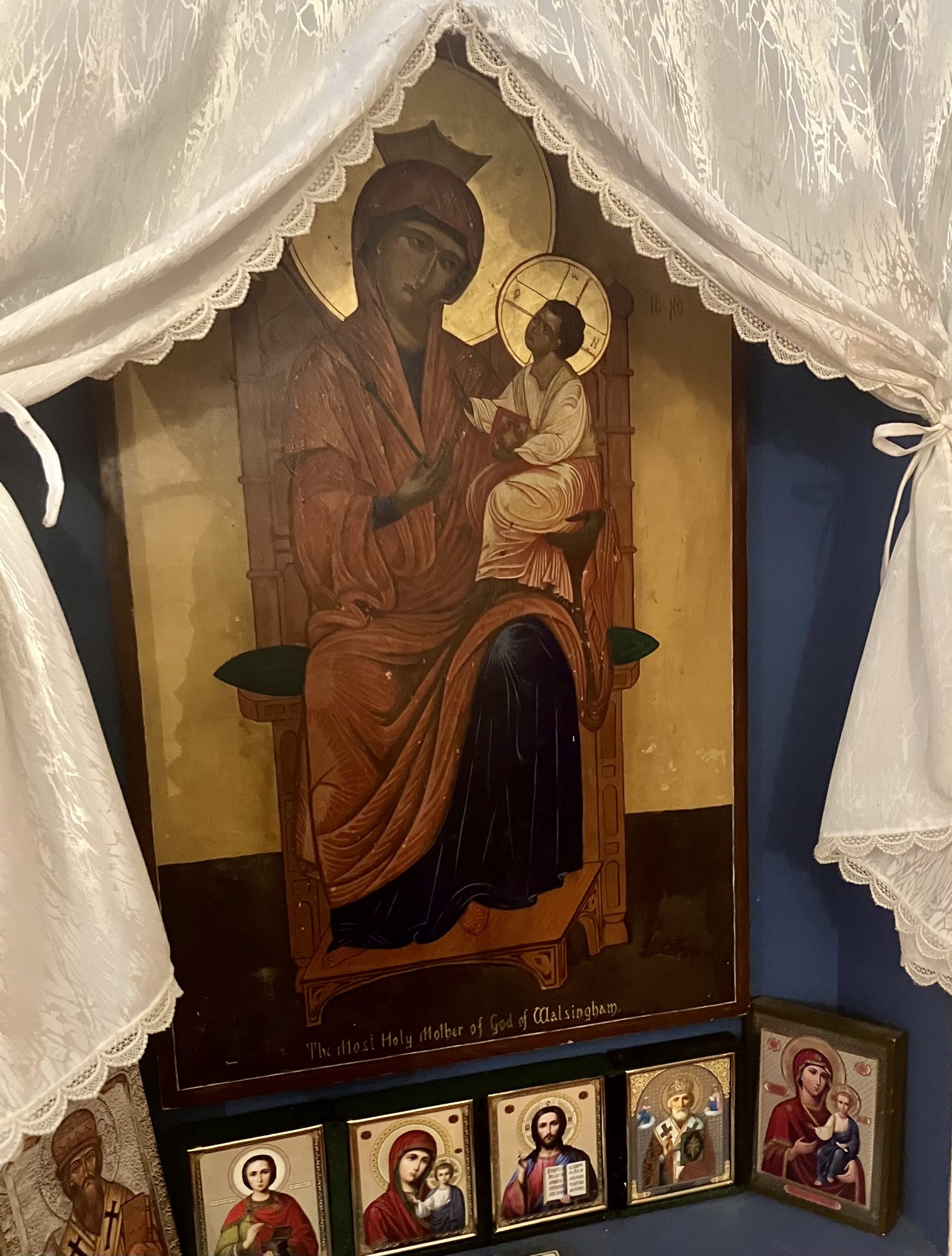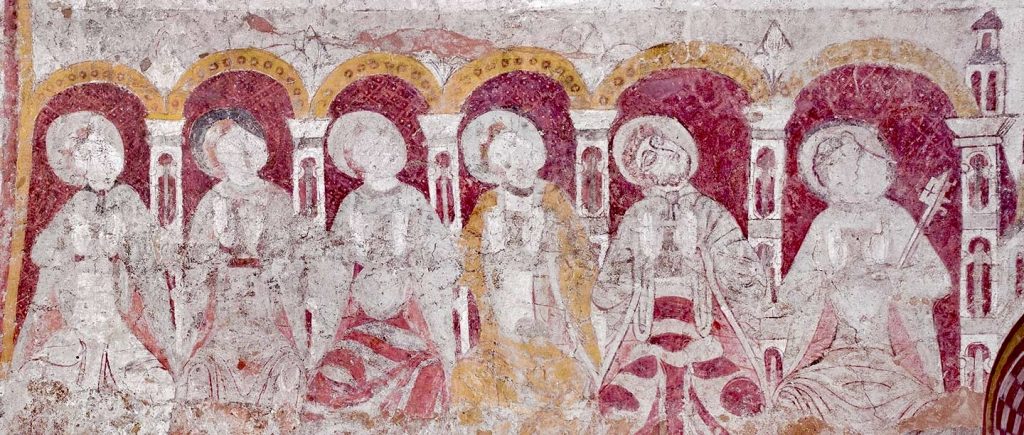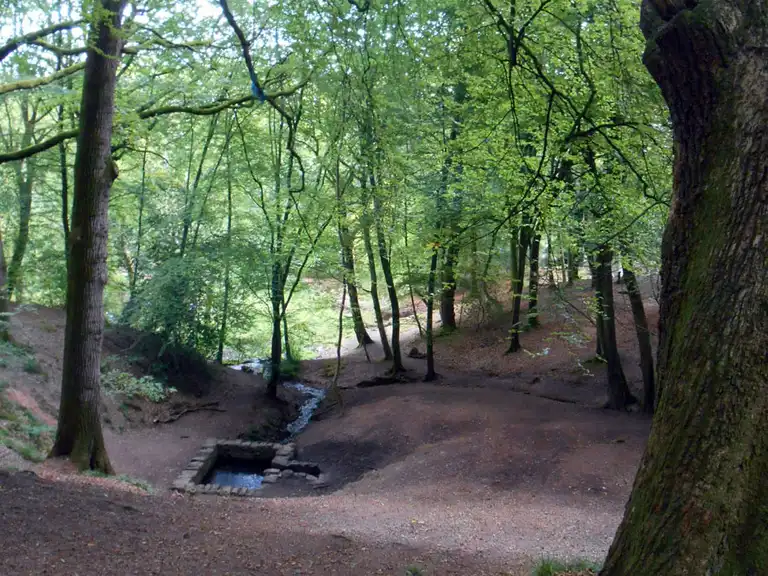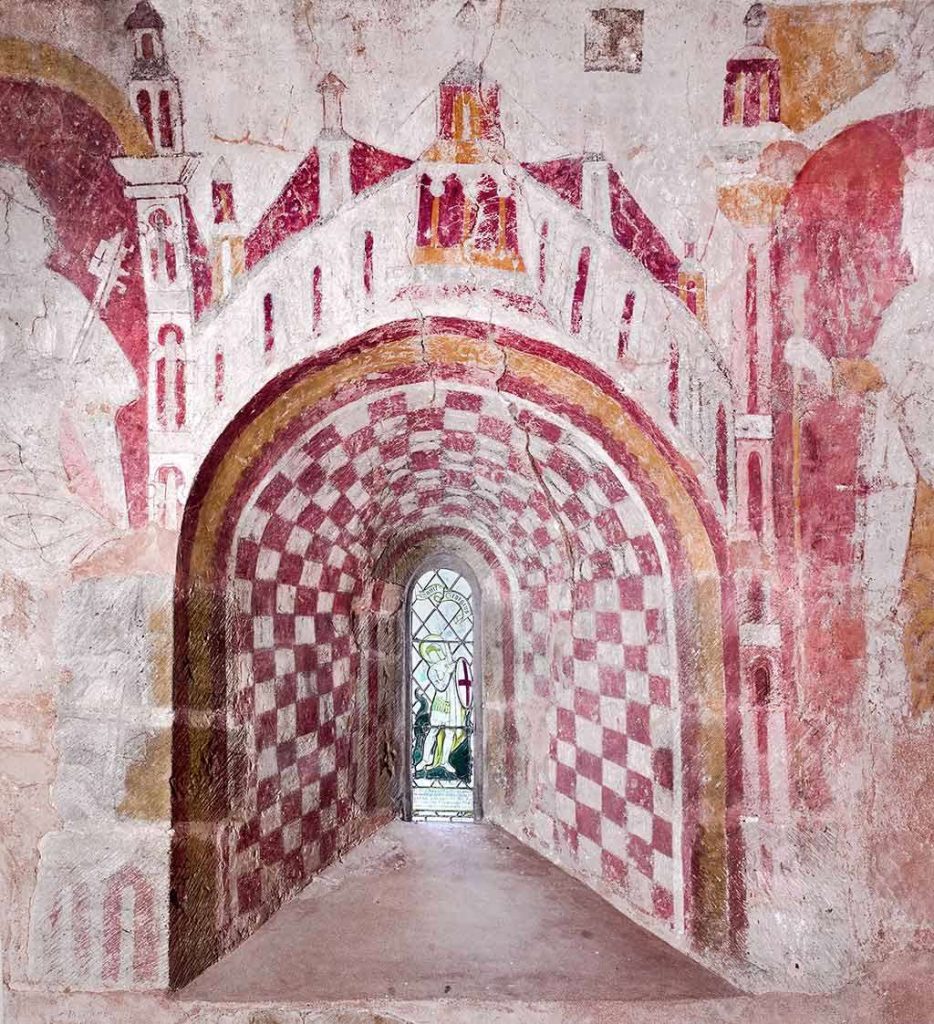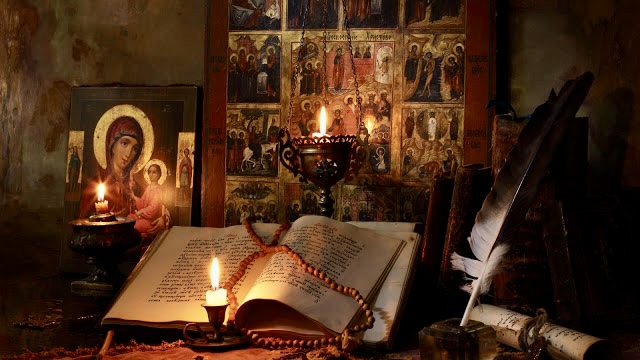
The General Order for Chanting a Canon – With Supplicatory Prayers to St Arilda
Dear brothers and sisters, one of our young people recently asked about the order for chanting canons and akathists, so this post will hopefully help.
We have previously published a simple order, which consists of the opening prayers with Psalm 50 and the creed before the canon/akathist, and then “It is truly meet…”, the Trisagion prayers and the dismissal.
The following order is a little more complex, mirroring the order of the moleben, but without readings, and is set out for use when there is no priest.
- As you will see, we begin with the opening prayers and the usual moleben Psalm (142).
- This is followed by “God is the Lord…” with its verses, and this is always chanted in the tone of the first troparion of the feast or saint that is being honoured.
- The troparion is then chanted twice, and after the Glory, we sing the Theotokion, which is a troparion to the Mother of God appointed to follow troparia.
- If we are honouring a Great Feast, we chant the troparion twice, and then repeat it after “Glory… Now and ever…”
- We then chant Psalm 50, although this is sometimes omitted, and the canon(s) follows.
- As some of our parishioners will be visiting Oldbury-on-Severn on Saturday, and will honour the Virgin-Martyr, Arilda, I have taken the canon for a Virgin-Martyr from the General Menaion and used this to illustrate the order of prayer. The General Menaion is used for the variable parts of services when there are none specific to a saint in the monthly menaion. We insert names into the general hymns.
- The canon is followed by “It is truly meet…” or a zadostoinik (a hymn to the Mother of God that takes the place of “It is truly meet…”), the Trisagion prayers, the troparion and kontakion (sometimes a prayer) and the dismissal sequence.
Once the faithful get used to this order, it will be straight forward and second nature!

Reader: Through the prayers of our Holy Fathers, Lord Jesus Christ, Son of God, have mercy upon us.
People: Amen.
O Heavenly King, O Comforter, * Spirit of Truth, Who art everywhere present and fillest all things, * Treasury of good things and Giver of life, * come and dwell in us, * and cleanse us of all impurity, ** and save our souls, O Good One.
Reader: Holy God, Holy Mighty, Holy Immortal, have mercy on us. (Thrice)
Glory be to the Father and to the Son, and to the Holy Spirit; now and ever, and unto the ages of ages. Amen.
O Most Holy Trinity, have mercy on us. O Lord, blot out our sins. O Master, pardon our iniquities. O Holy One, visit and heal our infirmities for Thy Name’s sake.
Lord, have mercy. (Thrice)
Glory be to the Father and to the Son, and to the Holy Spirit; now and ever, and unto the ages of ages. Amen.
Our Father, Who art in the heavens, hallowed be Thy name. Thy kingdom come, Thy will be done, on earth as it is in heaven. Give us this day our daily bread, and forgive us our debts, as we forgive our debtors; and lead us not into temptation, but deliver us from the Evil One.
Reader: Lord Jesus Christ, Son of God, have mercy upon us.
People: Amen.
Reader: Lord, have mercy. (Twelve times)
Glory be to the Father and to the Son, and to the Holy Spirit; now and ever, and unto the ages of ages. Amen
O come let us worship God our King.
O come let us worship and. fall down before Christ our King and God.
O come let us worship and fall down before Christ Himself, our King and God.
Psalm 142: O Lord, hear my prayer, give ear unto my supplication in Thy truth; hearken unto me in Thy righteousness. And enter not into judgment with Thy servant for in Thy sight shall no man living be justified. For the enemy hath persecuted my soul; he hath humbled my life down to the earth. He hath sat me in darkness as those that have been long dead, and my spirit within me is become despondent; within me my heart is troubled. I remembered days of old, I meditated on all Thy works, I pondered on the creations of Thy hands. I stretched forth my hands unto Thee; my soul thirsteth after Thee like a waterless land. Quickly hear me, O Lord; my spirit hath fainted away. Turn not Thy face away from me, lest I be like unto them that go down into the pit. Cause me to hear Thy mercy in the morning; for in Thee have I put my hope. Cause me to know, O Lord, the way wherein I should walk; for unto Thee have I lifted up my soul. Rescue me from mine enemies, O Lord; unto Thee have I fled for refuge. Teach me to do Thy will, for Thou art my God. Thy good Spirit shall lead me in the land of uprightness; for Thy name’s sake, O Lord, shalt Thou quicken me. In Thy righteousness shalt Thou bring my soul out of affliction, and in Thy mercy shalt Thou utterly destroy mine enemies. And Thou shalt cut off all them that afflict my soul, for I am Thy servant.
Glory be to the Father and to the Son, and to the Holy Spirit; now and ever, and unto the ages of ages. Amen.
Alleluia, alleluia, alleluia. Glory to Thee, O God. (Thrice)
And in Tone 4: God is the Lord, and hath appeared unto us. Blessed is he that cometh in the name of the Lord.
Stichos 1: O give thanks unto the Lord, for He is good, for His mercy endureth for ever.
People: God is the Lord…
Stichos 2: Surrounding me they compassed me, and by the Name of the Lord, I warded them off.
People: God is the Lord…
Stichos 3: I shall not die, but live, and I shall tell of the works of the Lord.
People: God is the Lord…
Stichos 4: The stone which the builders rejected, the same is become the head of the corner. This is the Lord’s doing, and it is marvellous in our eyes.
People: God is the Lord…
Troparion, Tone IV: Thy ewe-lamb Arilda, O Jesus crieth out with a loud voice: * “Thee do I love, O my Bridegroom, * and, seeking Thee, I endure suffering. * In Thy baptism I am crucified and buried with Thee. * I suffer for Thy sake, that I may reign with Thee; * I die for Thee, that I may live with Thee. * Accept me, who with love sacrifice myself for Thee, * as an unblemished offering!” ** By her supplications, in that Thou art merciful, save Thou our souls. (Twice)
Glory be to the Father and to the Son, and to the Holy Spirit; now and ever, and unto the ages of ages. Amen.
Theotokion, Tone IV: The mystery hidden from all ages * and unknown to the ranks of angels, * hath been revealed to those on earth through thee, O Theotokos: * God incarnate in an uncommingled union, * Who willingly accepted the Cross for our sake, * and through it hath raised up the first-formed man, ** and saved our souls from death.
Reader: Lord, have mercy. (Twelve times)
Psalm 50: Have mercy on me, O God, according to Thy great mercy; and according to the multitude of Thy compassions blot out my transgression. Wash me thoroughly from mine iniquity, and cleanse me from my sin. For I know mine iniquity, and my sin is ever before me. Against Thee only have I sinned and done this evil before Thee, that Thou mightest be justified in Thy words, and prevail when Thou art judged. For behold, I was conceived in iniquities, and in sins did my mother bear me. For behold, Thou hast loved truth; the hidden and secret things of Thy wisdom hast Thou made manifest unto me. Thou shalt sprinkle me with hyssop, and I shall be made clean; Thou shalt wash me, and I shall be made whiter than snow. Thou shalt make me to hear joy and gladness; the bones that be humbled, they shall rejoice. Turn Thy face away from my sins, and blot out all mine iniquities. Create in me a clean heart, O God, and renew a right spirit within me. Cast me not away from Thy presence, and take not Thy Holy Spirit from me. Restore unto me the joy of Thy salvation, and with Thy governing Spirit establish me. I shall teach transgressors Thy ways, and the ungodly shall turn back unto Thee. Deliver me from blood-guiltiness, O God, Thou God of my salvation; my tongue shall rejoice in Thy righteousness. O Lord, Thou shalt open my lips, and my mouth shall declare Thy praise. For if Thou hadst desired sacrifice, I had given it; with whole-burnt offerings Thou shalt not be pleased. A sacrifice unto God is a broken spirit; a heart that is broken and humbled God will not despise. Do good, O Lord, in Thy good pleasure unto Sion, and let the walls of Jerusalem be builded. Then shalt Thou be pleased with a sacrifice of righteousness, with oblation and whole-burnt offerings. Then shall they offer bullocks upon Thine altar.
+
The Canon, in Tone VIII
Ode I, Irmos: Let us sing unto the Lord, * who led His people through the Red Sea: * for He alone hath gloriously been glorified.
Holy Martyr Arilda pray to God for us!
By her wondrous actions the all-praised maiden Arilda inspires the choirs of heavenly hosts above and those of us here on Earth below to hymn her holy deeds.
Holy Martyr Arilda pray to God for us!
The Master of all loved the beauty of thy most fair heart, O all-praised one, wherefore He hath made thee worthy to dwell in the heavenly dwellings.
Glory be to the Father and to the Son, and to the Holy Spirit.
Thou, O Martyr, without fear underwent suffering, manifold wounds, and execution, taking with thee the sustaining grace of the Savior which helped thee to endure.
Now and ever, and unto the ages of ages. Amen.
We ever hymn thee, O most pure Theotokos, who above nature hast given birth unto the pre-eternal Incarnate and supremely divine Word.:
Ode III, Irmos: O Lord, thou art the confirmation of those who flee to Thee, * Thou art the Light of those in darkness, * and my spirit doth hymn Thee.
Holy Martyr Arilda pray to God for us!
Thou O all-praised Arilda, didst appear before thy judges with a courageous soul, vanquishing the cowardly enemy.
Holy Martyr Arilda pray to God for us!
Sporting neither blemish in thy beauty, nor any failing in thy soul, Christ received thee as a fair bride in His incorruptible palaces.
Glory be to the Father and to the Son, and to the Holy Spirit.
O all-praised Martyr of Christ Arilda, heal the scars of my soul, and by thine intercessions still the stormy seas of my life.
Now and ever, and unto the ages of ages. Amen.
All Orthodox Christians have acquired in thee a refuge and an unshakable rampart, wherefore we unceasingly magnify thee, O thou who knewest not wedlock.
Katavasia: Pray to God for us, O Holy Virgin-Martyr, Arilda, for we eagerly betake ourselves unto thee, who art a spreedy helper and intercessor for our souls.
Lord, have mercy. (Thrice)
The Sessional Hymn, in Tone VIII: With the streams of thy blood * thou hast drowned the wicked, O all-praised Martyr of Christ, * and from joyous clouds of grace thou dost ever water the spiritual meadows, * rearing up therein the fruits of faith; * wherefore after thy repose thou hast appeared lustrously as a luminous cloud, * shedding forth the testimony of thy life. * O all-praised spiritual athlete Arilda, * pray to Christ God that those whom with love honor thy holy memory * be granted the remission of their sins.
Glory be to the Father and to the Son, and to the Holy Spirit; now and ever, and unto the ages of ages. Amen.
Theotokion in Tone VIII: All we, the generations of mankind, * call thee blessed, * in that thou art the Virgin who alone among women * hast given birth without seed unto God in the flesh; * for the fire of the Godhead made its abode within thee, * and thou didst feed the Creator and Lord * with milk as an infant. * Wherefore, we, the race of mankind and of angels, * worthily glorify thine all-holy birthgiving, * and together we cry out to thee: * Entreat Christ God to grant forgiveness of sins ** unto those who with faith worship thine all-holy Offspring.
Ode IV, Irmos: O Lord, I have heard the mystery of Thy dispensation; * I haveconsidered Thy works, * and I have glorified Thy Divinity.
Holy Martyr Arilda pray to God for us!
Presenting thyself as an unstained mirror of divine understanding, thou, O Martyr, doth shine forth in the midst of women sufferers like a golden lamp of priceless beauty.
Holy Martyr Arilda pray to God for us!
Thou didst not offer sacrifice unto the dumb demons, O invincible Martyr Arilda, but rather with love desired to receive a life-bestowing death for thy piety.
Glory be to the Father and to the Son, and to the Holy Spirit.
With the other passion-bearers, O unblemished Arilda, thou didst bear upon thy body countless wounds, and yet remained without pangs through the manifestation of divine love.
Now and ever, and unto the ages of ages. Amen.
As the only Sinless One, grant deliverance from ignorance unto us, and peace to Thy world, O God, through the intercession of her who gave birth to Thee.
Ode V, Irmos: Rising early we cry to Thee, O Lord; * save us, for Thou art our God, * and we know none other besides Thee.
Holy Martyr Arilda pray to God for us!
Having learned the difference between the spiritual day and the darkness of the world, thou didst rebuke the contentious spirit.
Holy Martyr Arilda pray to God for us!
Imagining he would be able to weaken thy divine strength, O Martyr Arilda, the most cunning enemy hath only made himself a subject of derision.
Glory be to the Father and to the Son, and to the Holy Spirit.
Grant unto me, O all-praised one, enlightenment and peace, and by thine intercessions disperse the great agitation and confusion that afflicts my soul.
Now and ever, and unto the ages of ages. Amen.
We hymn thee as a Virgin, O Theotokos, even after child-birth, for thou hast brought forth into the world God the Word in the flesh.
Ode VI, Irmos: O Thou that puttest on light as a garment * grant me also a robe of light, * O All-merciful Christ, our God.
Holy Martyr Arilda pray to God for us!
Bearing valiant wisdom of mind while in thy feminine body, thou, O glorious one, didst not fear beasts of land and sea.
Holy Martyr Arilda pray to God for us!
Vanquishing the pride of thy tormentors, thy soul remained unharmed, O invincible Martyr, wherefore thou didst receive a crown of victory.
Glory be to the Father and to the Son, and to the Holy Spirit.
As righteous and beautiful, as honorable and resplendent with the radiance of virginity, the Bridegroom, even the Lord, hath brought thee to Himself, O most glorious martyr.
Now and ever, and unto the ages of ages. Amen.
As the only one who hath given birth in the flesh unto the Word, we beseech thee to deliver our souls from the snares of the enemy.
Katavasia: Pray to God for us, O Holy Virgin-Martyr, Arilda, for we eagerly betake ourselves unto thee, who art a spreedy helper and intercessor for our souls.
Lord, have mercy. (Thrice)
Glory be to the Father and to the Son, and to the Holy Spirit; now and ever, and unto the ages of ages. Amen.
Kontakion, Tone II: Finding thine all-revered temple (and holy spring)* to be a source of healing for our souls, * we the faithful with a loud voice cry unto thee, * O greatly renowned Maiden-Martyr Arilda, ** entreat Christ God unceasingly on behalf of us all.
Ikos: Having gathered together today let us worthily honor the Martyr of Christ Arilda, that by her intercessions, our souls and bodies be may delivered from all pestilence, earthquake and plague, and that we may pass our lives in humility, and thereby be granted to praise God together with all the saints that pleased Him in ages past, and to walk in the un-waning light. For Thou, O Savior, hast bedewed with Thy mercies all those who in faith praise her. Wherefore we cry unto her, unceasingly pray for us all.
Ode VII, Irmos: The Children of Judaea, * who of old came to dwell in Babylon, * trampled underfoot the flame of the furnace * through their faith in the Trinity, * as they sang: “O God of our fathers, blessed art Thou.”
Holy Martyr Arilda pray to God for us!
The manly-courage of the divine Martyrs is beyond understanding, for the Creator of maketh His creation subject to those who in the midst of their suffering cry out: “O God of our Fathers, blessed art Thou.”
Holy Martyr Arilda pray to God for us!
The glorious maiden hath silenced the wicked mouths of her tormentors and subdued the pride of the lawless, while in the Holy Spirit she divinely sang: “O God of our Fathers, blessed art Thou.”
Glory be to the Father and to the Son, and to the Holy Spirit.
Of old, the trio of devout youths burned those who superheated the fiery furnace; and now, as then, the Divinely-wise maiden, hymning the Trinity, inspires us to sing: “O God of our Fathers, blessed art Thou.”
Now and ever, and unto the ages of ages. Amen.
O Savior, when thou didst deign to accomplish our salvation; Thou didst enter the womb of the Virgin and reveal her to be a sure intercessor for all the world: “O God of our Fathers, blessed art Thou.”
Ode VIII, Irmos: The King of heaven, * Who is glorified by the hosts of angels, * let uspraise and supremely exalt throughout all ages.
Holy Martyr Arilda pray to God for us!
The exceedingly blessed among women Arilda, having been rewarded with grace from the Most High, now hymneth, praising Christ throughout all ages.
Holy Martyr Arilda pray to God for us!
Strengthened by the thought of the Bridegroom and caring for things spiritual, thou didst give up thy body, even unto death, and inherited eternal life.
Glory be to the Father and to the Son, and to the Holy Spirit.
The Bridegroom, mysteriously descending unto the most pure maiden in the furnace, hath, by the dew of the Holy Spirit, and in accordance with the good pleasure of the Father, saved her who hymneth Christ throughout all ages.
Now and ever, and unto the ages of ages. Amen.
Despise not, O pure Virgin; those that seek thine aid, and who chant and extol thee throughout all ages.
Ode IX, Irmos: With never ceasing praises we magnify thee, * the Mother of God Most High, * who art higher than the most pure hosts, * and who beyond comprehension knew not wedlock, * yet hath truly given birth to God.
Holy Martyr Arilda pray to God for us!
From on high thou wast granted to understand that the flow of thy blood was a token of thy future incorruptible life, O all-praised martyr, wherefore thou hast appeared unto all who draw nigh to thee, to be an inexhaustible treasury of healings.
Holy Martyr Arilda pray to God for us!
In accordance with the law of nature, O divinely-wise one, thou didst suffer death, which thou didst willingly endure; and upon death, which was witnessed to by the flow of thine own blood, thine all-precious body was laid to rest remaining incorrupt.
Glory be to the Father and to the Son, and to the Holy Spirit.
As the fairest bride of Christ and an illumining sun, as a truly chosen turtle-dove and as a fertile olive tree more comely than the cedars of Lebanon we all praise thee, O godly-revered Arilda.
Now and ever, and unto the ages of ages. Amen.
O bride who knewest not wedlock, receptacle of sweet fragrance, the true and immaculate Virgin and Mother who received in thy womb the heavenly rain descending from the cloud of light, thee do we magnify.
Zadostoinik, Tone VIII: Receive the prayers of thy servants, O Sovereign Lady, and deliver us from every need and sorrow. Thou art our weapon, O Mother of God, and a wall of refuge; thou art the Mediatrix, and unto thee do we run, and now we cry in prayer to thee, that thou mightest deliver us from our enemies. We all exalt thee, O blameless Mother of Christ our God, whom the Holy Spirit hath overshadowed.
Reader: Holy God, Holy Mighty, Holy Immortal, have mercy on us. Thrice.
Glory be to the Father and to the Son, and to the Holy Spirit, now and ever, and unto the ages of ages. Amen.
O Most Holy Trinity, have mercy on us. O Lord, blot out our sins. O Master, pardon our iniquities. O Holy One, visit and heal our infirmities for Thy name’s sake.
Lord, have mercy. (Thrice).
Glory be to the Father and to the Son, and to the Holy Spirit, now and ever, and unto the ages of ages. Amen.
Our Father, Who art in the heavens, hallowed be Thy name. Thy kingdom come, Thy will be done, on earth as it is in heaven. Give us this day our daily bread, and forgive us our debts, as we forgive our debtors; and lead us not into temptation, but deliver us from the Evil One.
Reader: Lord Jesus Christ, Son of God, have mercy upon us.
People: Amen.
Troparion, in Tone IV: Thy ewe-lamb Arilda, O Jesus crieth out with a loud voice: * “Thee do I love, O my Bridegroom, * and, seeking Thee, I endure suffering. * In Thy baptism I am crucified and buried with Thee. * I suffer for Thy sake, that I may reign with Thee; * I die for Thee, that I may live with Thee. * Accept me, who with love sacrifice myself for Thee, * as an unblemished offering!” ** By her supplications, in that Thou art merciful, save Thou our souls.
Glory be to the Father and to the Son, and to the Holy Spirit; now and ever, and unto the ages of ages. Amen.
Kontakion, in Tone II: Finding thine all-revered temple (and holy spring)* to be a source of healing for our souls, * we the faithful with a loud voice cry unto thee, * O greatly renowned Maiden-Martyr Arilda, ** entreat Christ God unceasingly on behalf of us all.
Reader: Lord, have mercy. (Forty times)
O holy Virgin-Martyr, Arilda, look upon us with a merciful eye, and hearken unto our small supplication; and as thou didst flee the pollution of the world, and refusing the defilement of sin didst become a ewe-lamb offered unto the Lord, we humbly pray and bessech thee to intercede for us before the Master and Shepherd of His sheep. Help us, that encumbered as we are with the pleasures and ease of life, we may emulate thy martyrdom, resisting the lures and temptations of the world, and may be granted the grace to struggle for purity of body, mind and soul. Pray to God for us, that we may join thee in the Heavenly Kingdom, and that as pure and unblemished offerings, holy to the Lord, He may grant to us healing of soul and body, and great mercy.
People: Amen,
Reader: Most Holy Mother of God, save us.
People: More honourable than the Cherubim, and beyond compare more glorious than the Seraphim, who without defilement gavest birth to God the Word, the true Theotokos, thee do we magnify.
Glory be to the Father and to the Son, and to the Holy Spirit; now and ever, and unto the ages of ages. Amen. Lord, have mercy. (Thrice) Lord, bless.
Reader: Lord Jesus Christ, Son of God, through the prayers of Thy Most-Pure, Mother, of the Holy Virgin-Martyr Arilda, and all the saints, have mercy upon us and save us, for Thou art a merciful God and lovest mankind.
People: Amen.
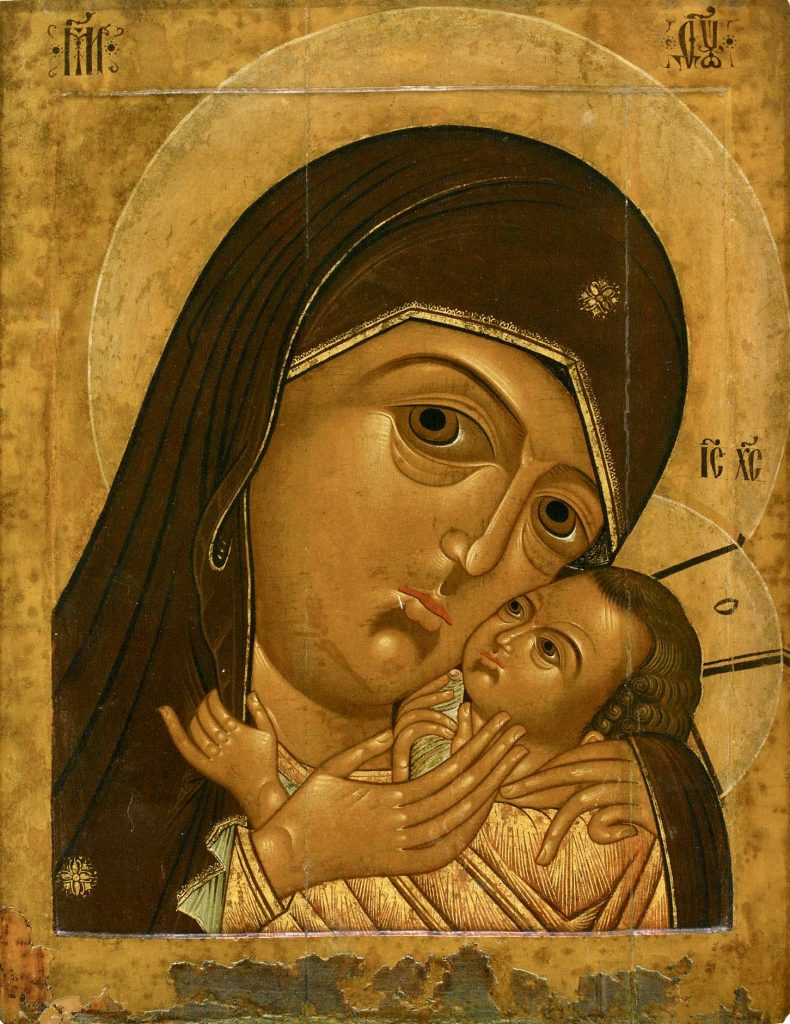 Ode I, Irmos: Let us all chant a triumphant hymn unto God * Who wrought wondrous miracles * with His upraised arm, * and saved Israel, * for He hath been glorified.
Ode I, Irmos: Let us all chant a triumphant hymn unto God * Who wrought wondrous miracles * with His upraised arm, * and saved Israel, * for He hath been glorified.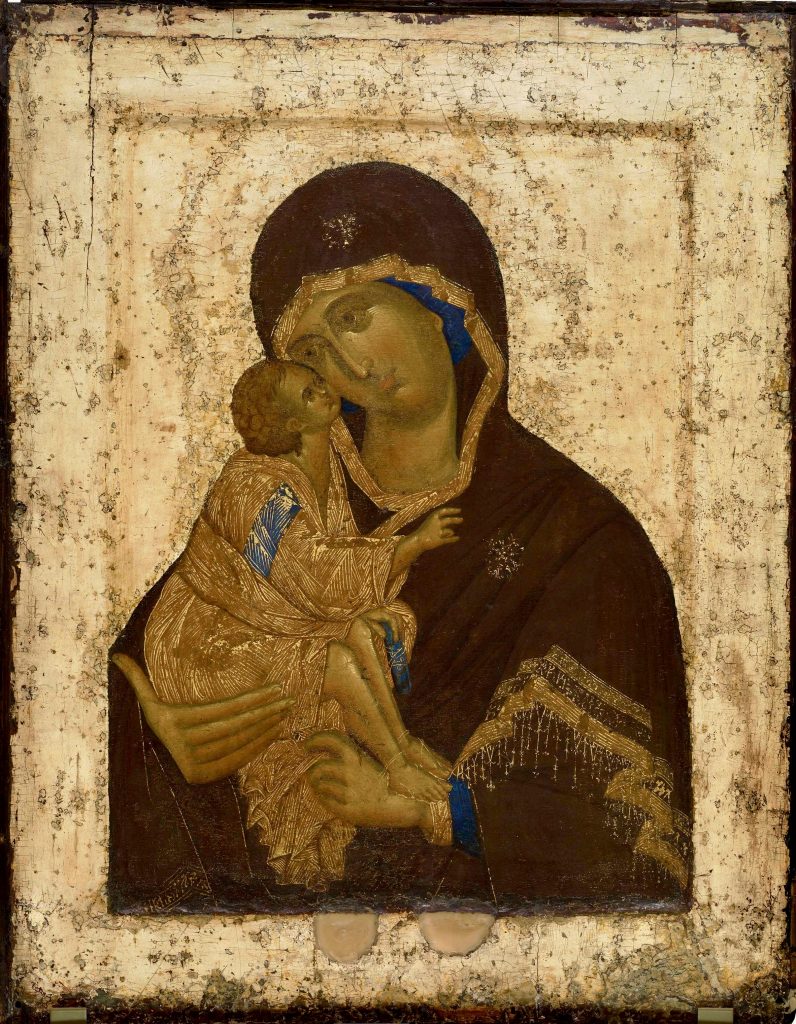 Ode I, Irmos: At thy command O Lord, * the nature of the waters that beforehand flowed freely was transformed * and became like the earth; * whereby Israel having traversed them dryshod * chanted unto Thee a hymn of victory.
Ode I, Irmos: At thy command O Lord, * the nature of the waters that beforehand flowed freely was transformed * and became like the earth; * whereby Israel having traversed them dryshod * chanted unto Thee a hymn of victory.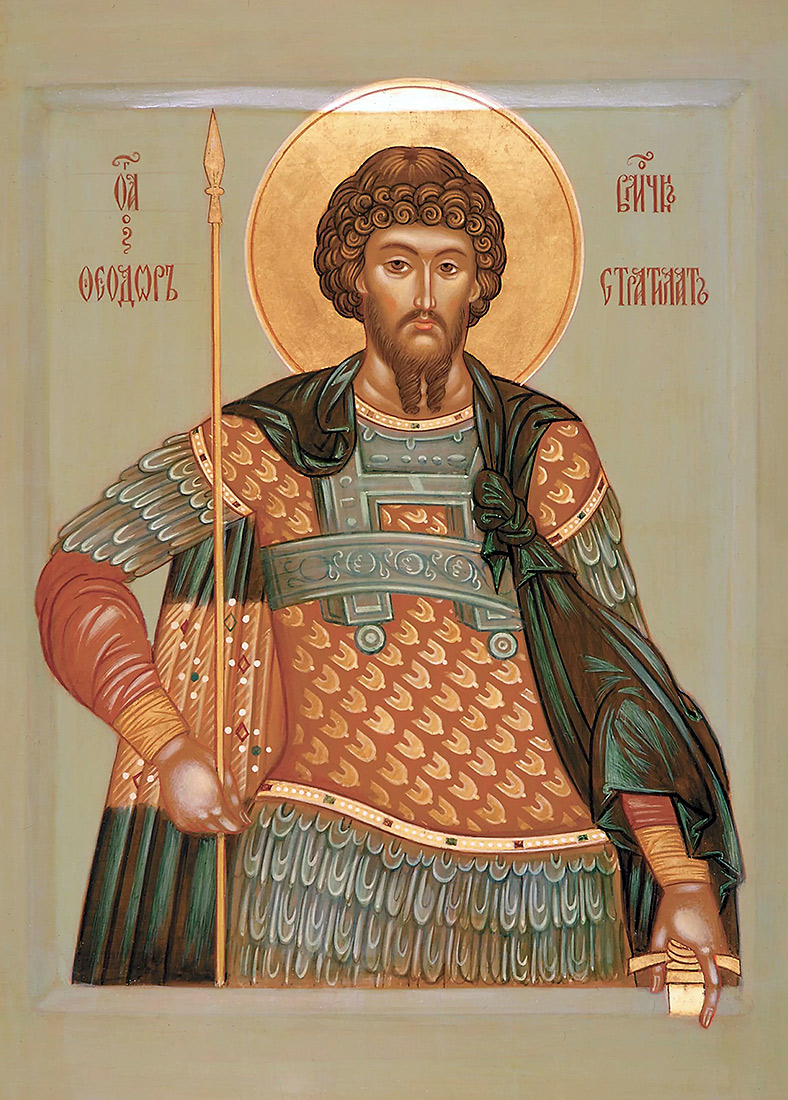
 “ According to a long-standing tradition, maintained for centuries in Dorset, St. Wite was a local righteous woman who lived in the ninth century in Charmouth, now a spot two miles away from the village of Whitchurch Canonicorum, where her relics have been kept. It is possible that she was an anchoress who served God in unceasing prayer and solitude, maintained fires as beacons on the cliffs to protect sailors, and was eventually martyred by the pagan Danes, who through the ninth century made regular raids on English monasteries. Not only did these Vikings attack, plunder and burn down monasteries situated both near the sea coasts and inland, they would also lay waste to the surrounding countryside and put to death Christians and ascetics. St. Wite most probably fell victim to one such raid. Some scholars give the year 830 as the possible date of her martyrdom, though no early records of this saint survive.”
“ According to a long-standing tradition, maintained for centuries in Dorset, St. Wite was a local righteous woman who lived in the ninth century in Charmouth, now a spot two miles away from the village of Whitchurch Canonicorum, where her relics have been kept. It is possible that she was an anchoress who served God in unceasing prayer and solitude, maintained fires as beacons on the cliffs to protect sailors, and was eventually martyred by the pagan Danes, who through the ninth century made regular raids on English monasteries. Not only did these Vikings attack, plunder and burn down monasteries situated both near the sea coasts and inland, they would also lay waste to the surrounding countryside and put to death Christians and ascetics. St. Wite most probably fell victim to one such raid. Some scholars give the year 830 as the possible date of her martyrdom, though no early records of this saint survive.” 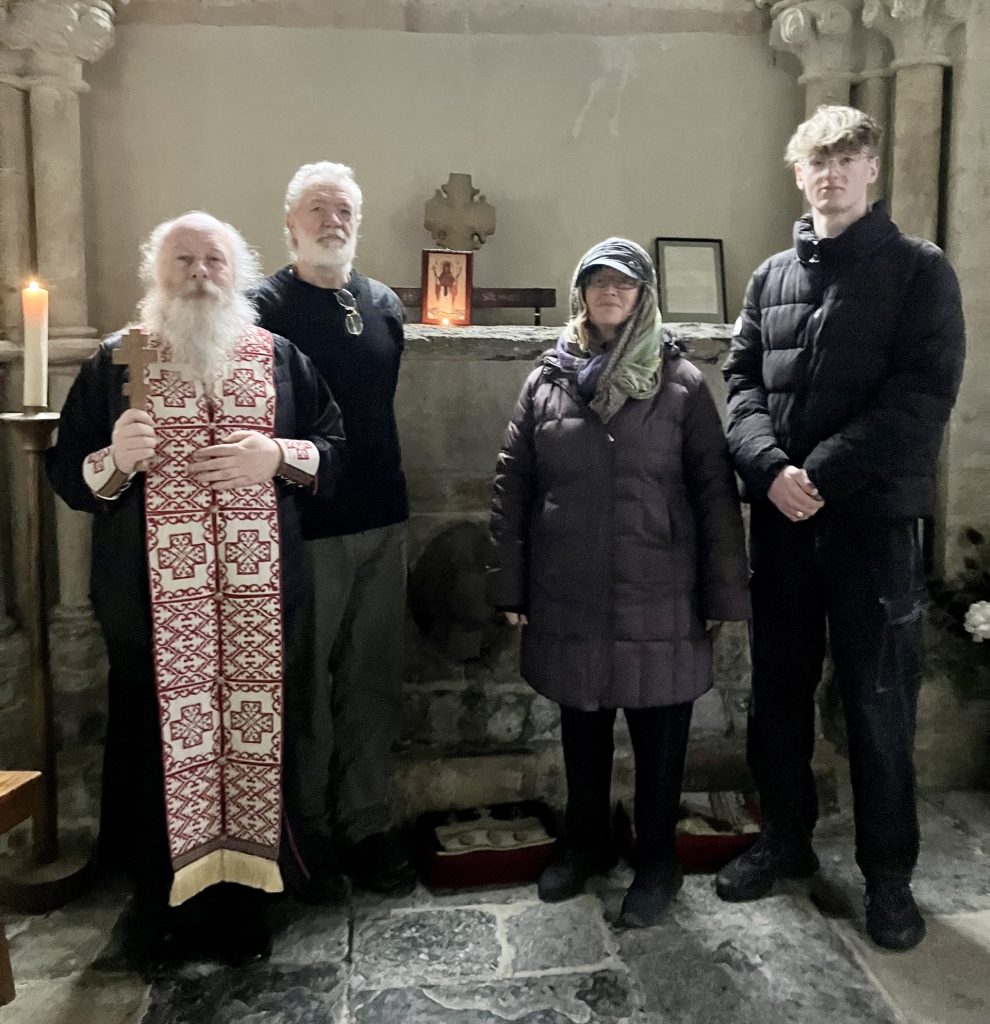
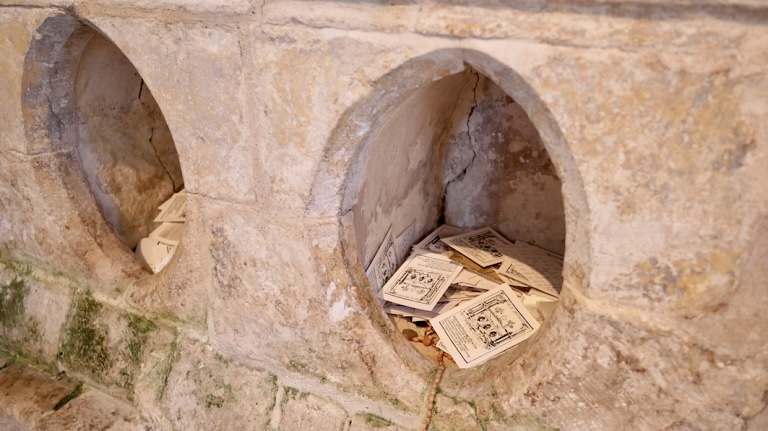
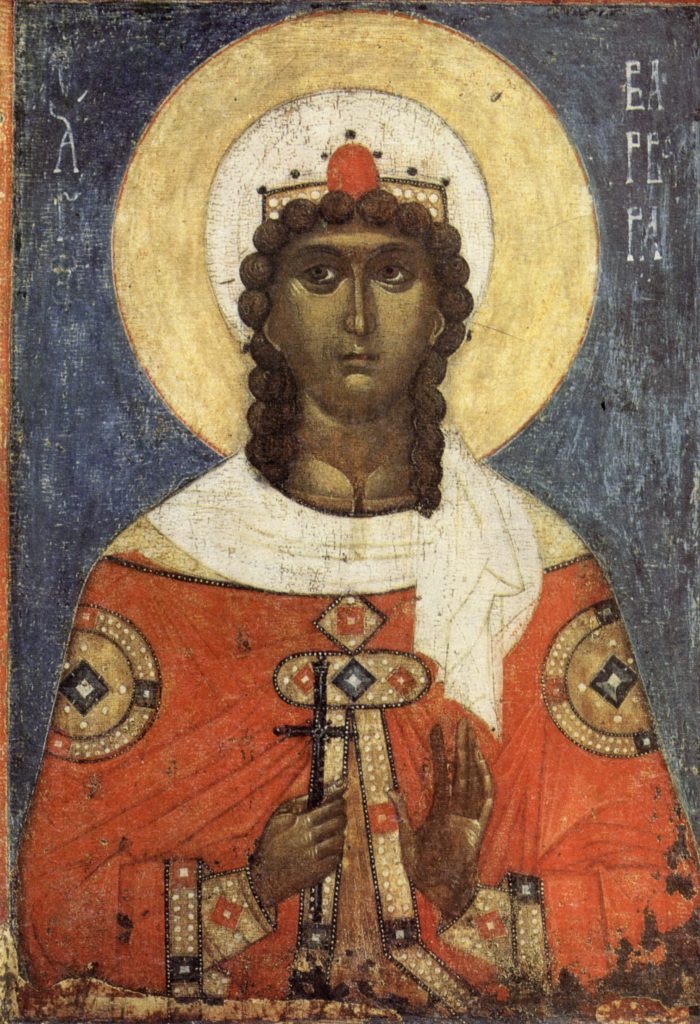
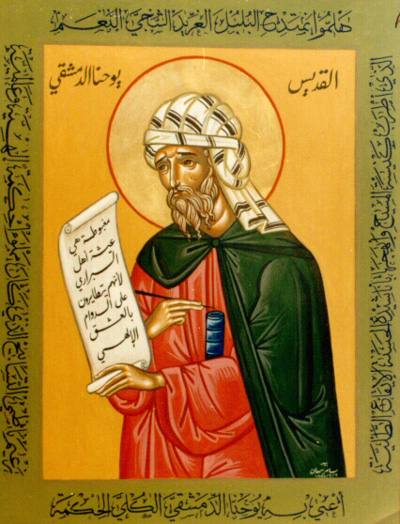
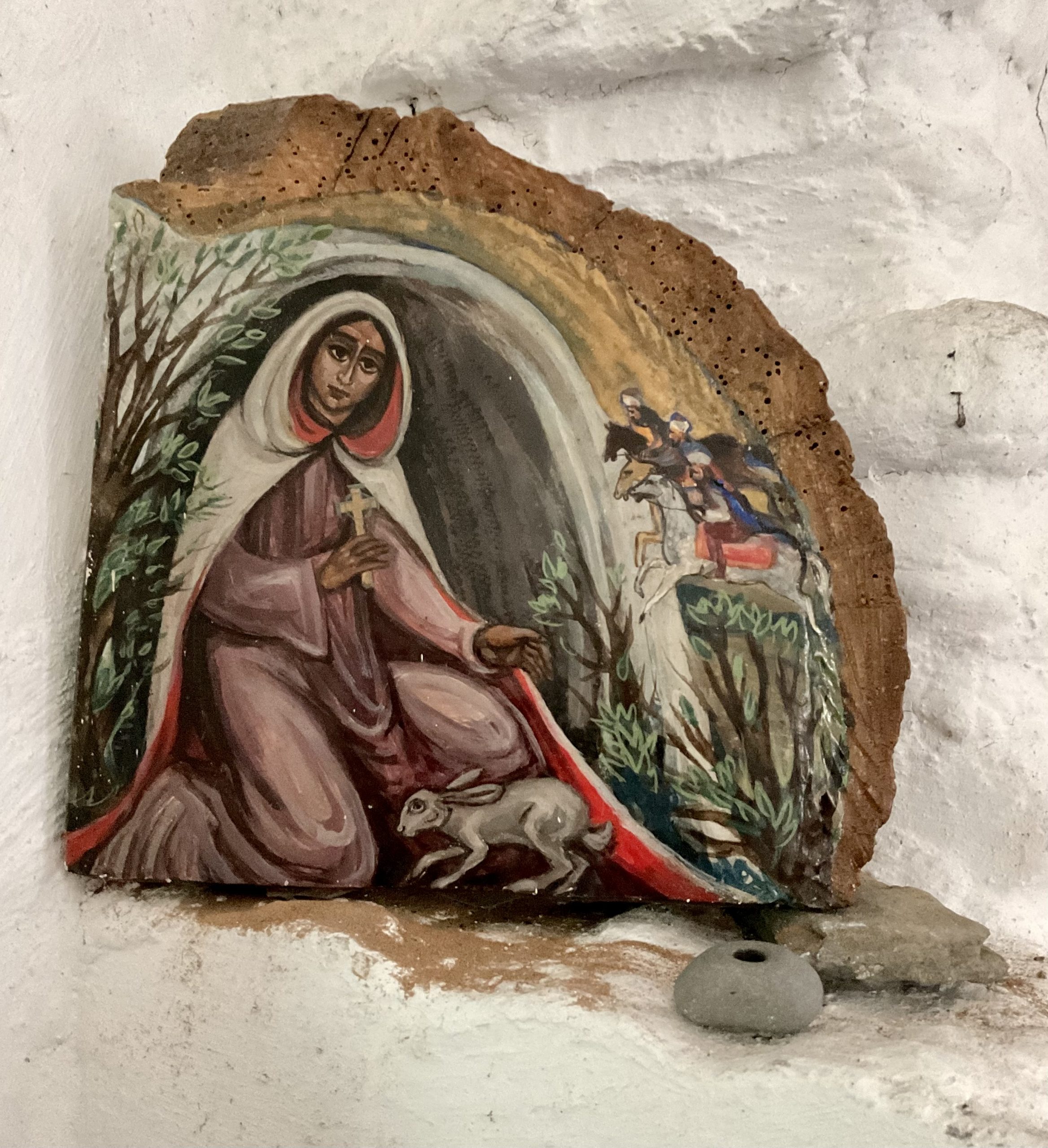
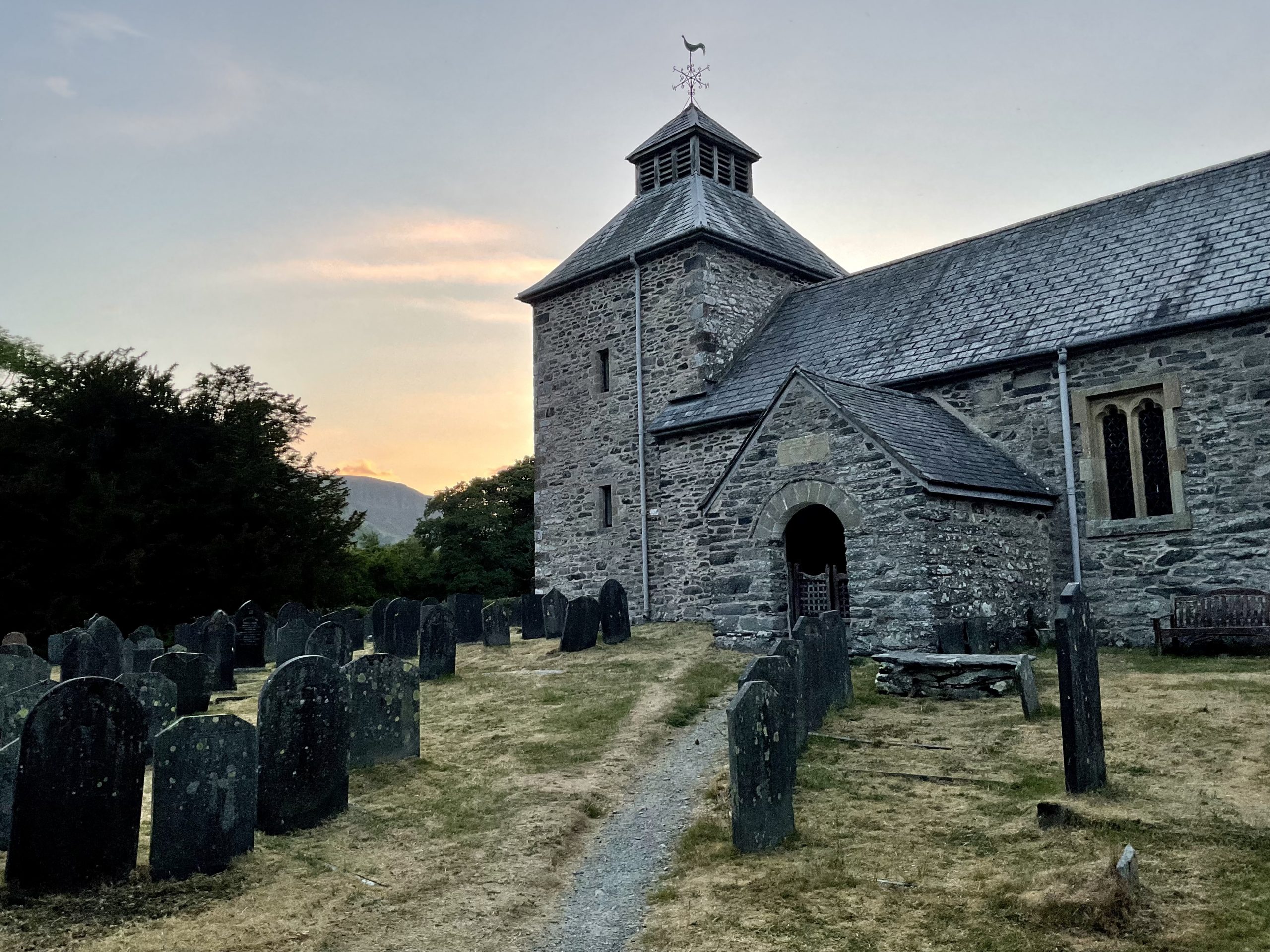
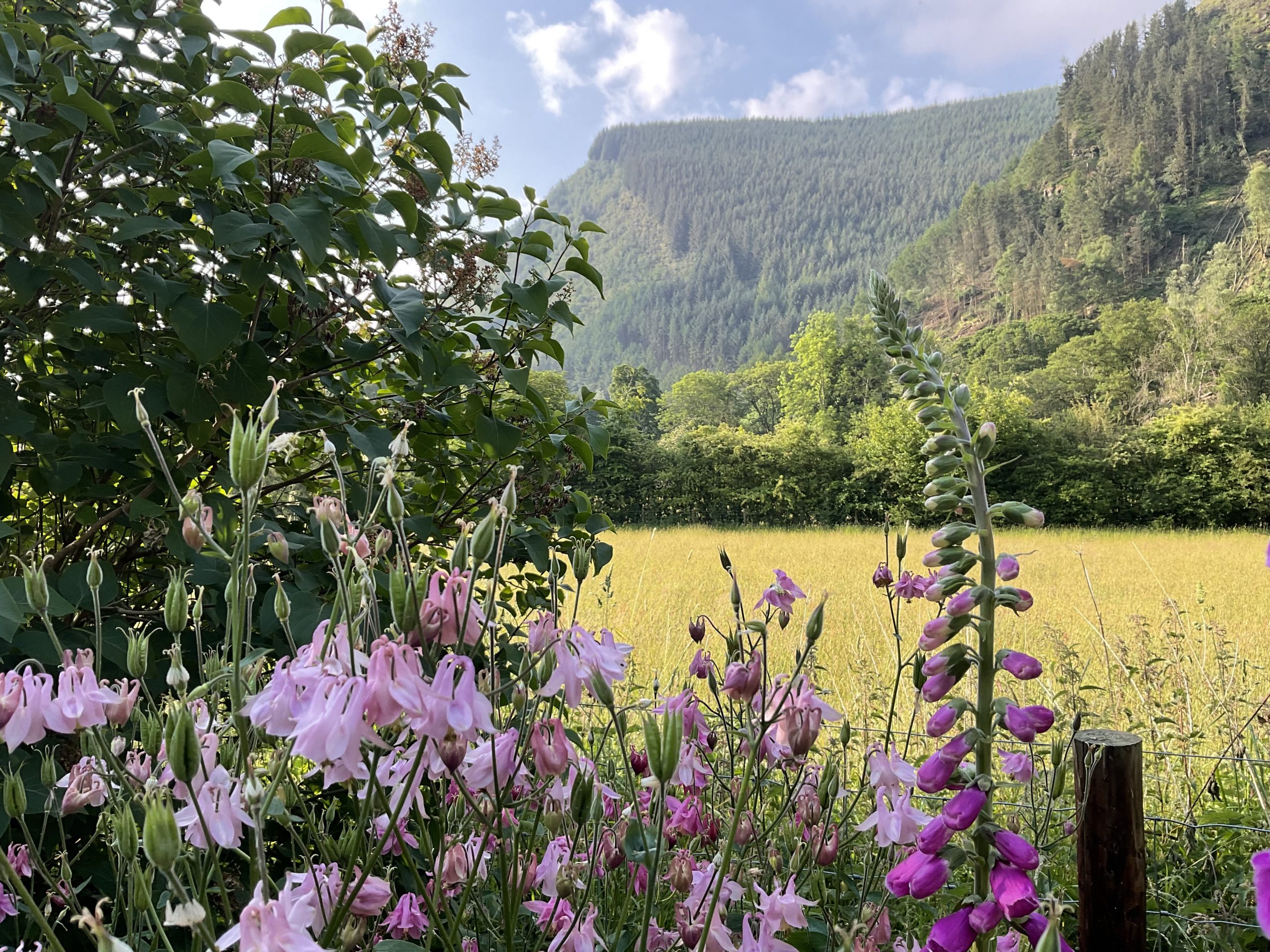
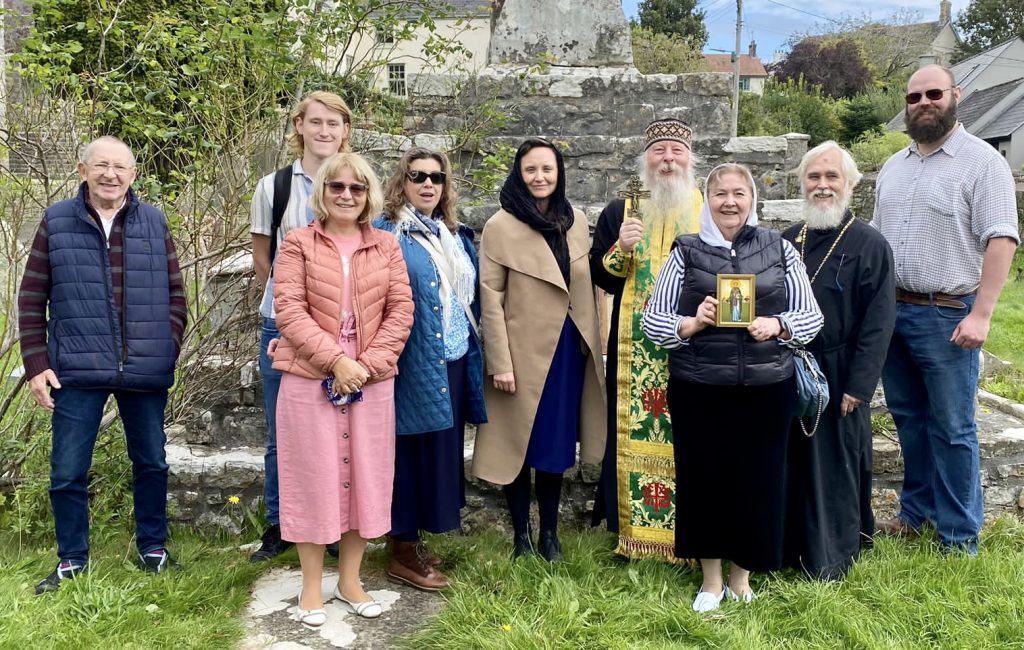
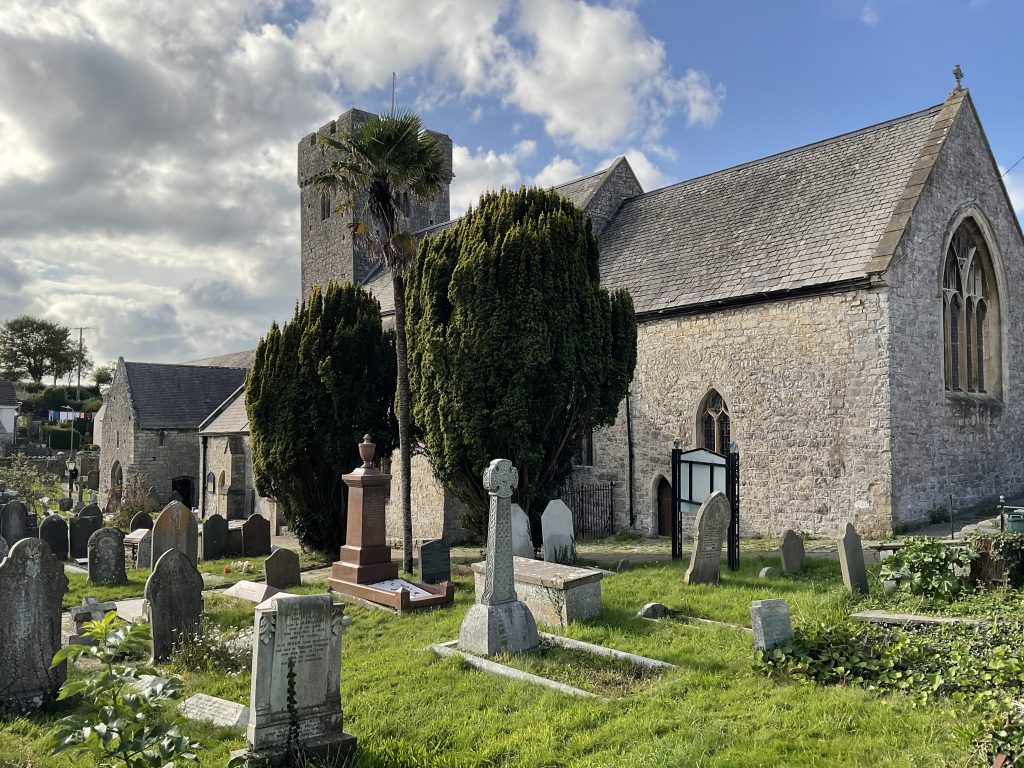
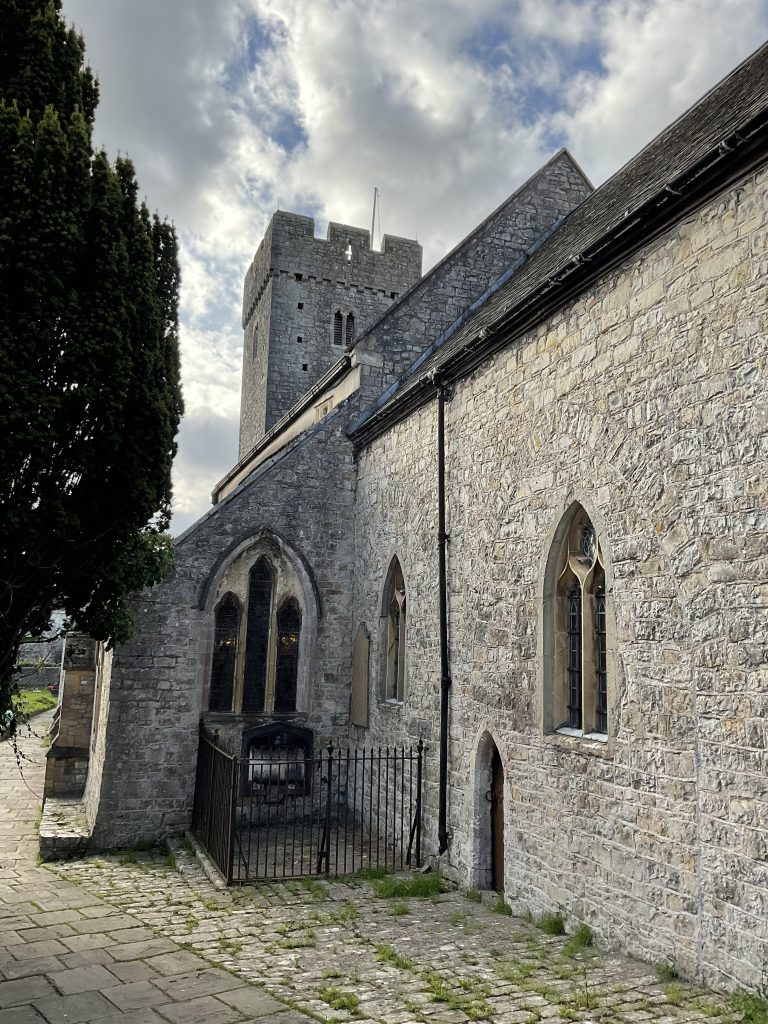 Though Father Luke and some of our South Wales parishioners visited around six years ago, I hadn’t been for something like a dozen years, and I had forgotten the scale of the church that developed over the centuries on the original Celtic site.
Though Father Luke and some of our South Wales parishioners visited around six years ago, I hadn’t been for something like a dozen years, and I had forgotten the scale of the church that developed over the centuries on the original Celtic site.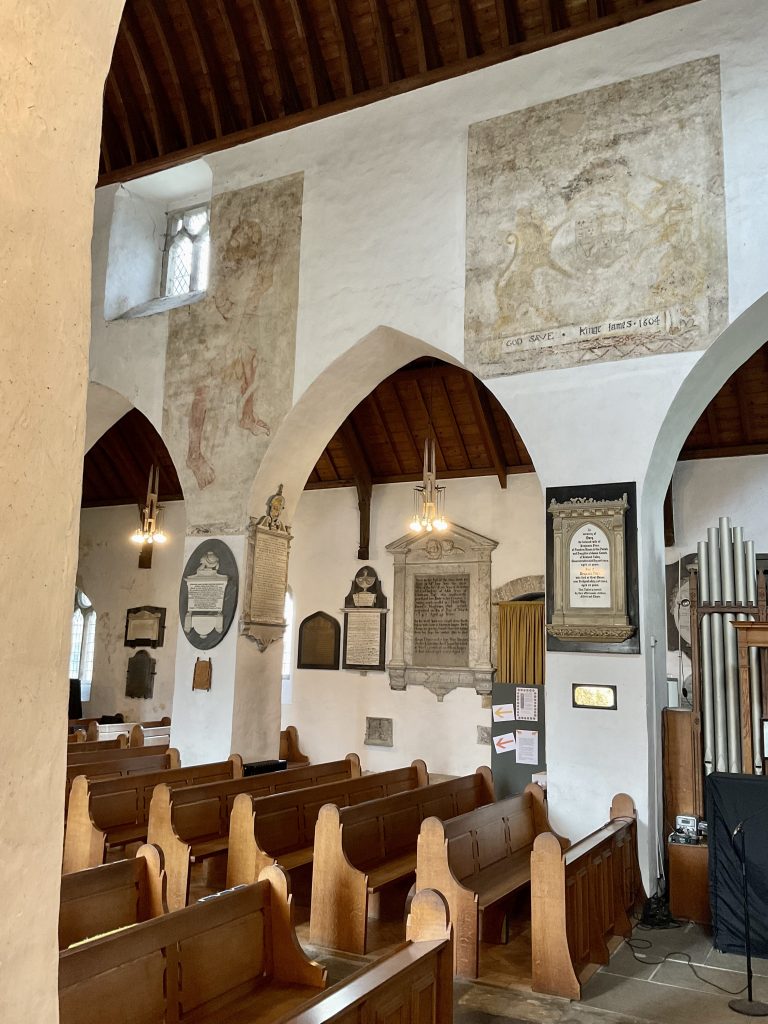
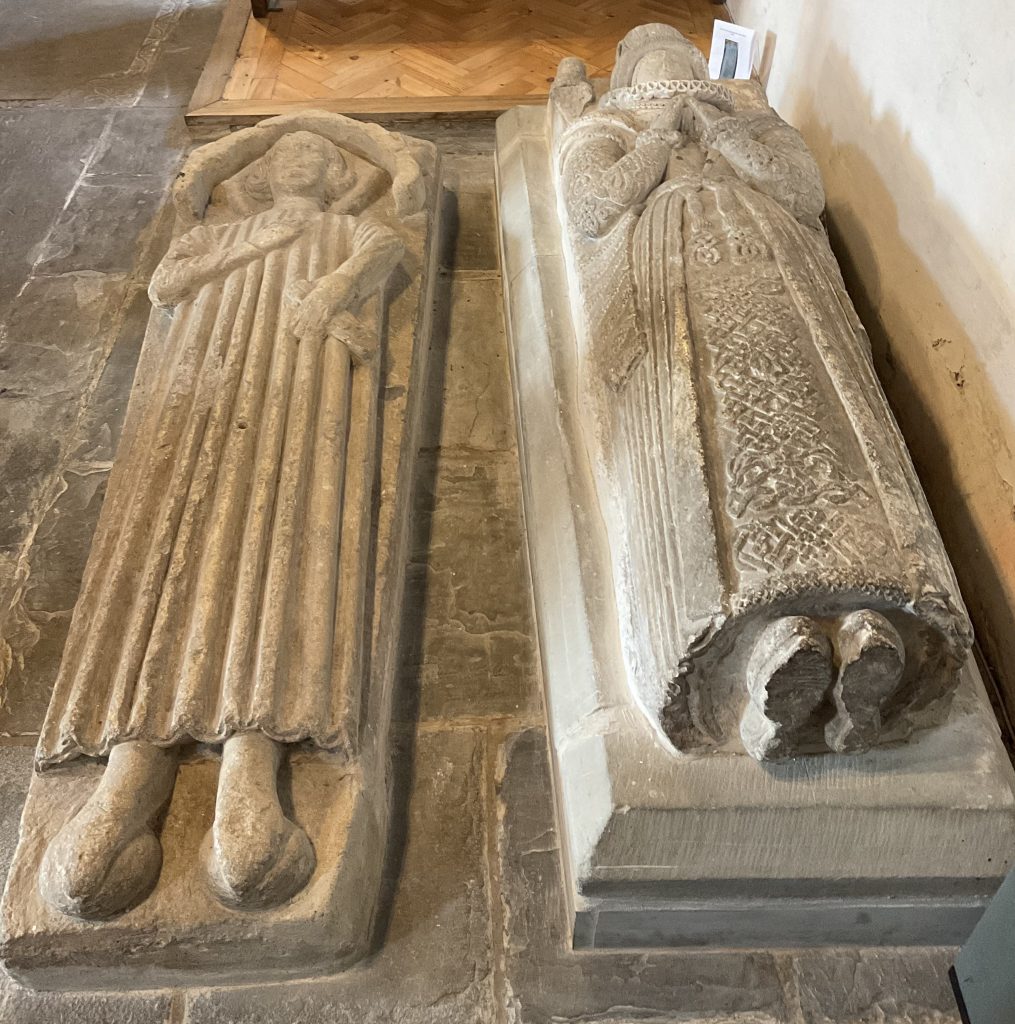
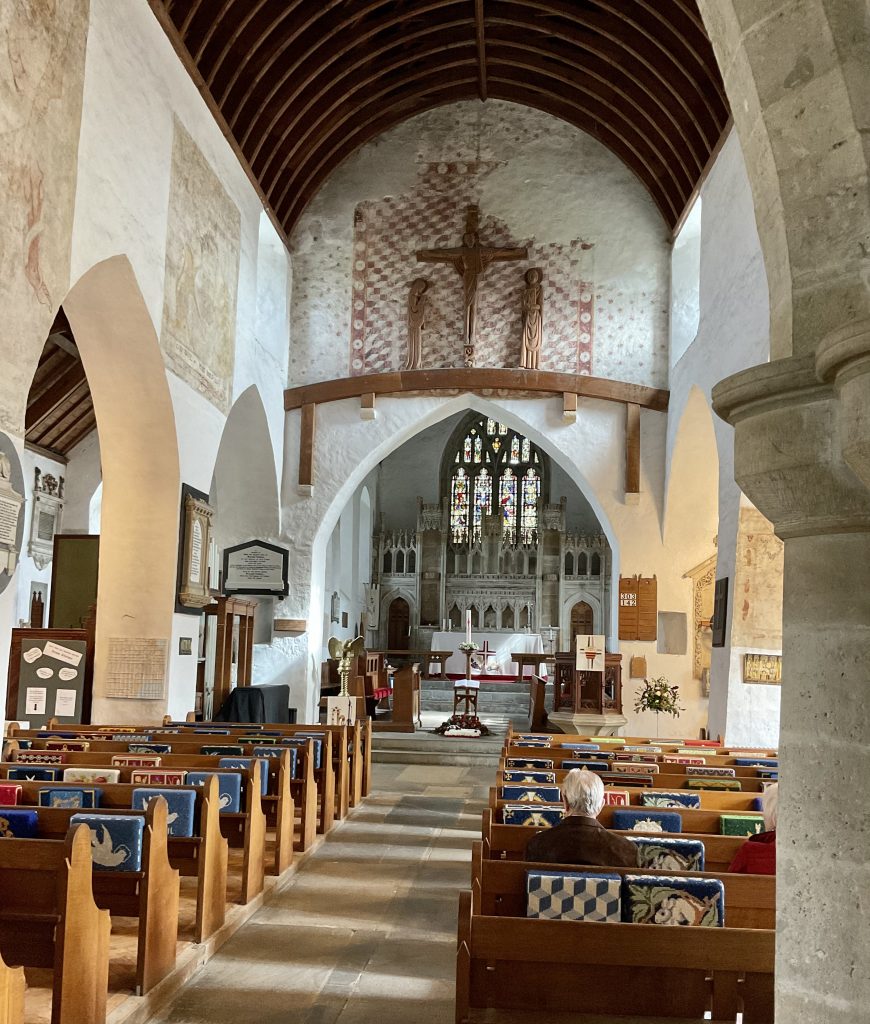
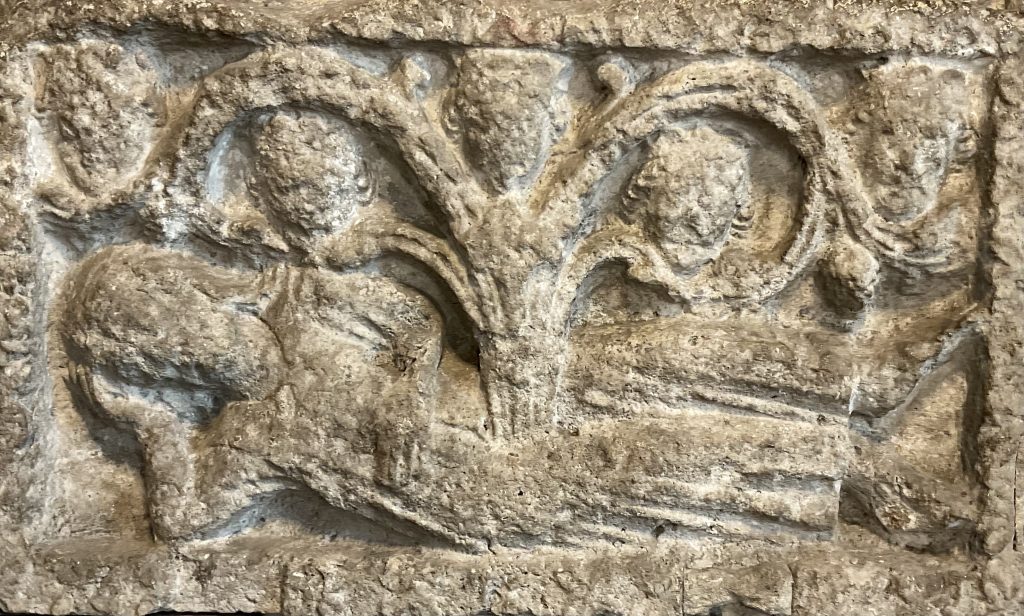
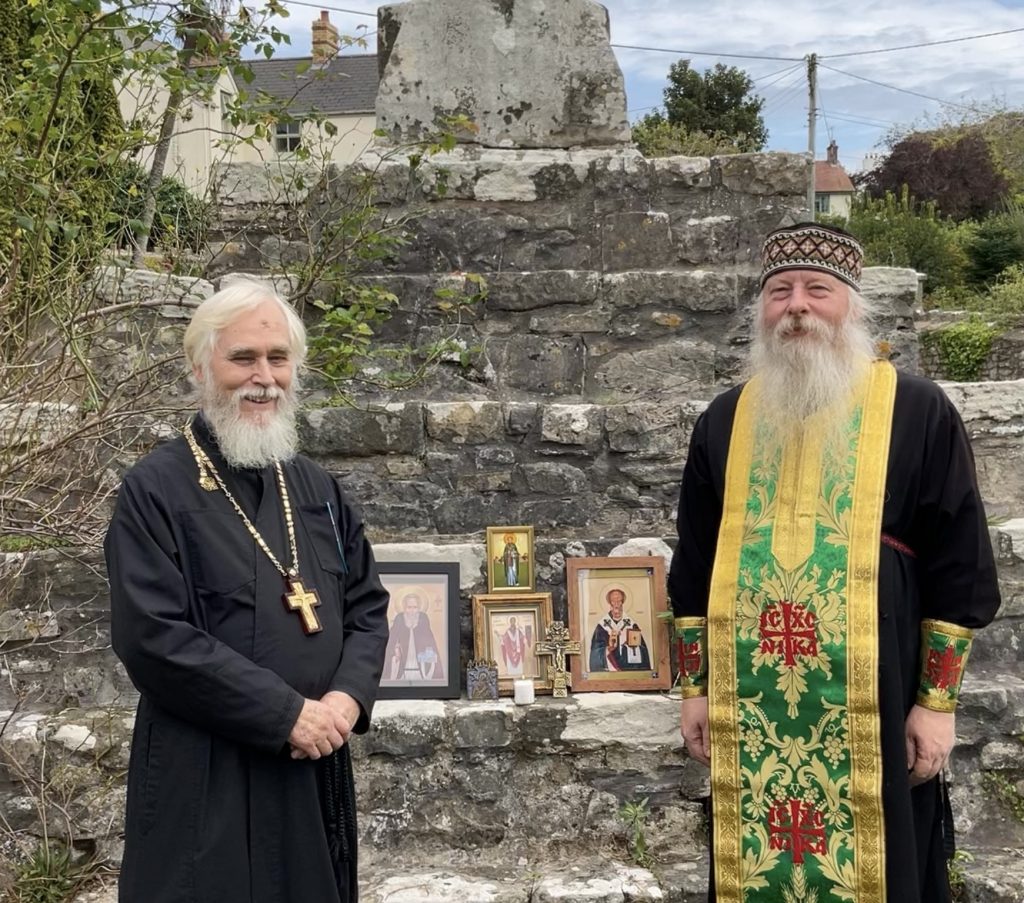

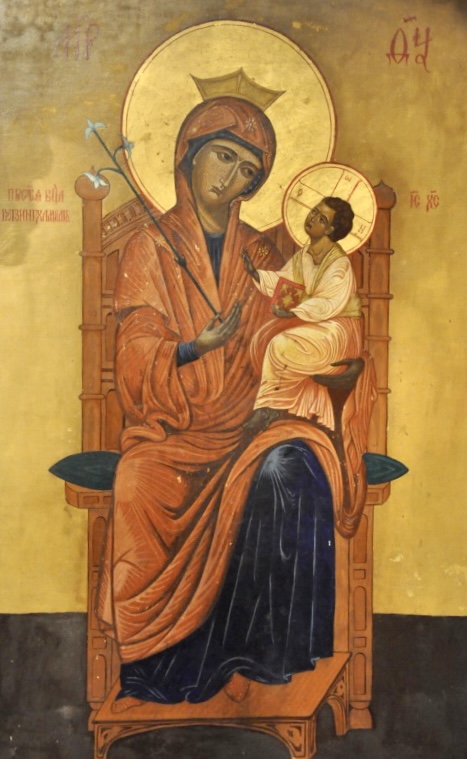 Monday’s arrival saw Mother Melangell rather surprised by the unexpected number around the tea-table at the skete, though she remained unfazed and received everyone graciously.
Monday’s arrival saw Mother Melangell rather surprised by the unexpected number around the tea-table at the skete, though she remained unfazed and received everyone graciously. 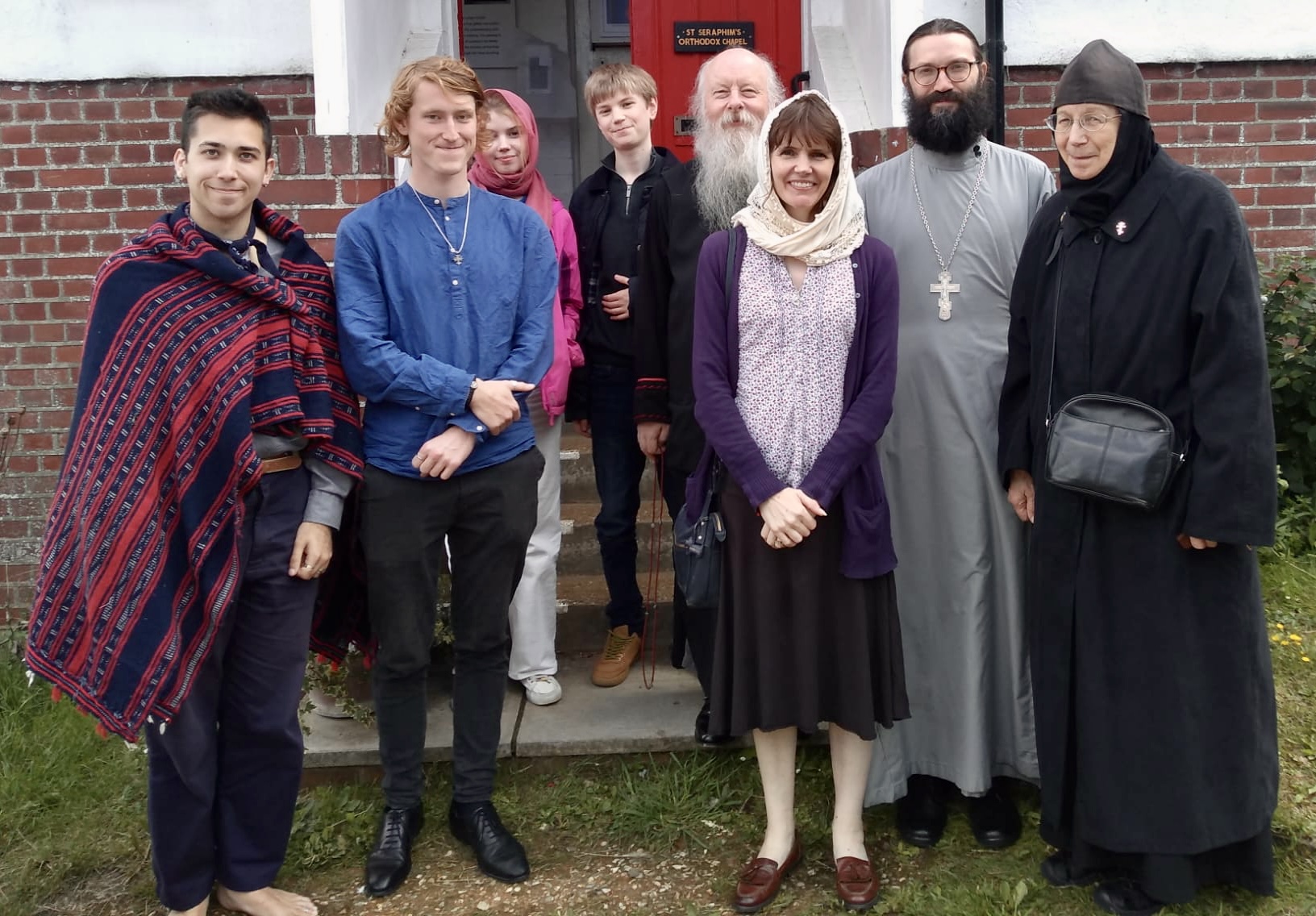
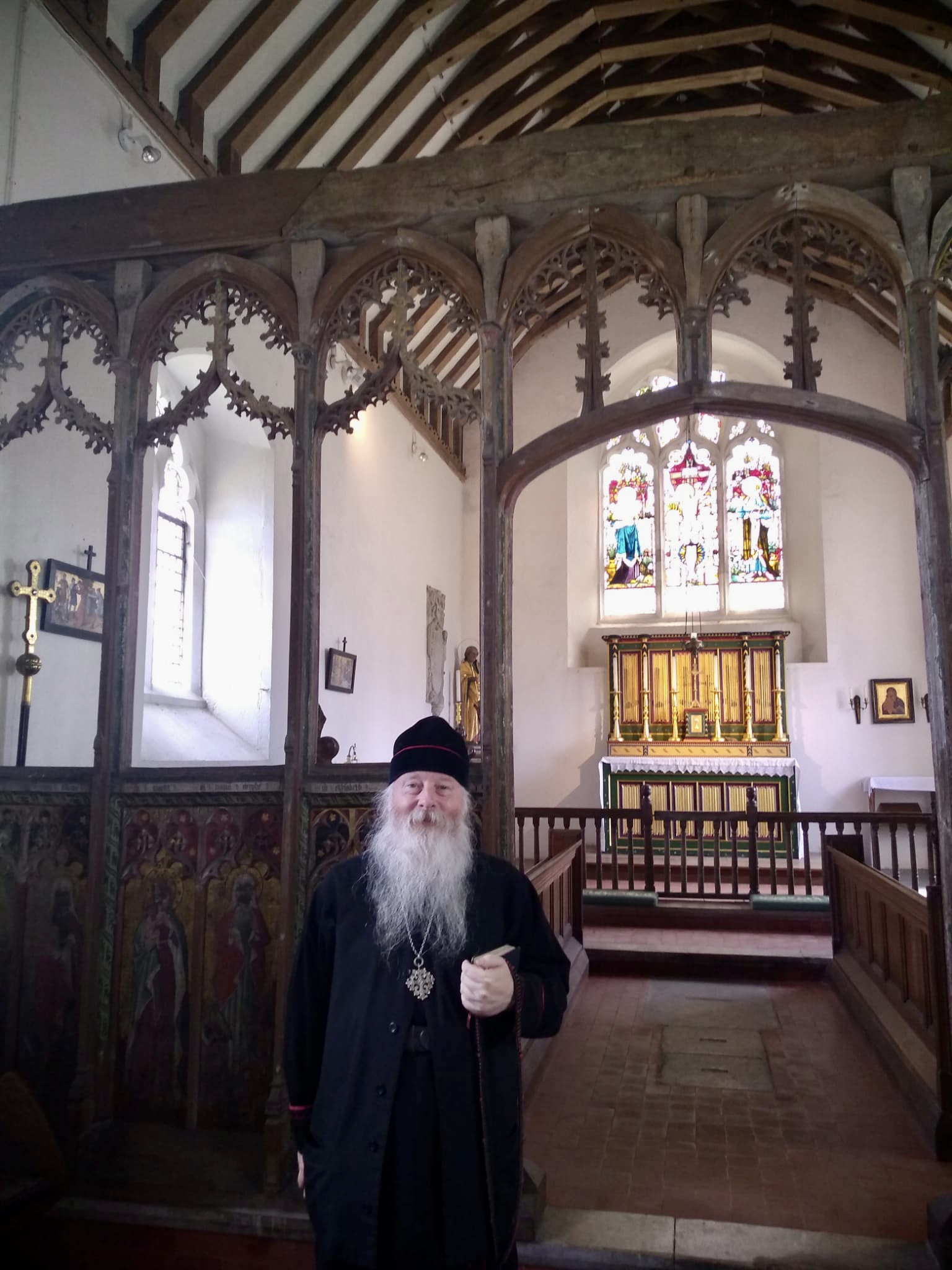
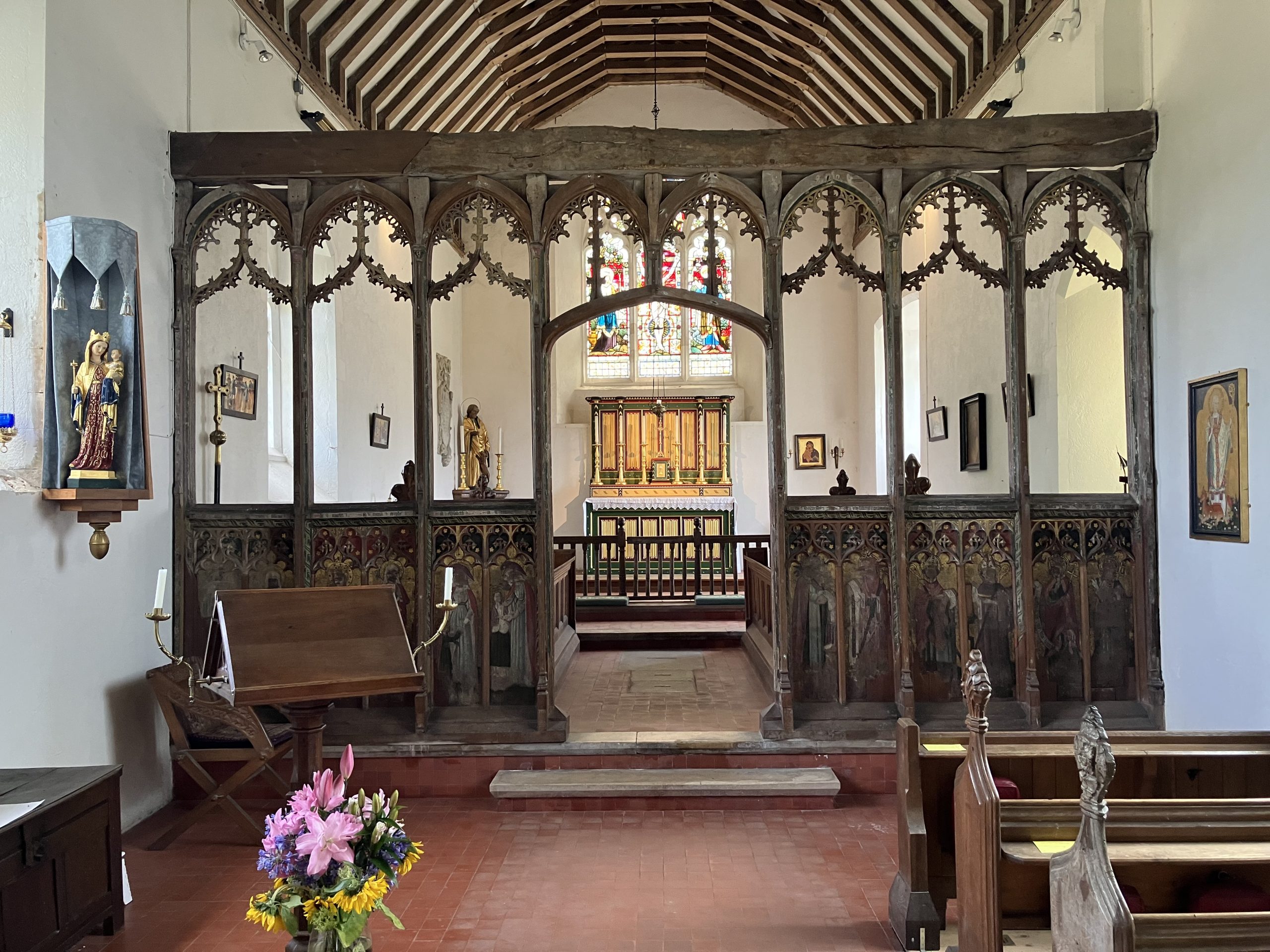
 On our return, after supper, I was very happy that a number our pilgrims took advantage of the Orthodox Chapel, going upstairs to pray, whilst I heard confessions.
On our return, after supper, I was very happy that a number our pilgrims took advantage of the Orthodox Chapel, going upstairs to pray, whilst I heard confessions.